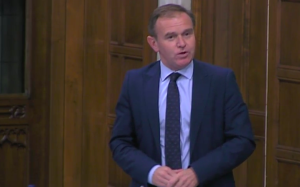Millions of animals are suffering unnecessarily by being slaughtered without stunning to meet religious demands.
That's why we campaign to end religious exemptions to animal welfare laws.
Animal welfare law requires animals to be stunned before slaughter to minimise their pain, suffering and distress. The only exemption is for Jewish and Muslim communities to meet kosher and halal religious dietary preferences.
The scientific consensus is clear that it is more humane to stun an animal prior to slaughter. The slaughter of animals without pre-stunning is permitted in the UK despite a recommendation by the government's own advisory body, the Farm Animal Welfare Council (FAWC), that the practice should be banned. FAWC concluded that animals slaughtered without pre-stunning are likely to experience "very significant pain and distress".
RSPCA, Compassion in World Farming and the British Veterinary Association all support an end to non-stun slaughter to improve animal welfare at the time of death.
- 70% of Brits think stunning animals before slaughtering them is more ethical.
- 72% of the population think food produced from religious non-stun slaughter methods should be clearly labelled.
We support the right to religious freedom. But this is not an absolute right. Religious exemptions shouldn't be made to laws meant to prevent unnecessary animal cruelty.
Take action!
1. Write to your MP
Ask your MP to end the religious exemption that allows animals to be slaughtered without pre-stunning.
2. Share your story
Tell us why you support this campaign, and how you are personally affected by the issue. You can also let us know if you would like assistance with a particular issue.
3. Join the National Secular Society
Become a member of the National Secular Society today! Together, we can separate religion and state for greater freedom and fairness.
Latest updates
NSS challenges government backtracking on non-stun meat labelling
Posted: Thu, 19 Sep 2019 13:58
The National Secular Society has urged the government to rethink its position on non-stun slaughter after a minister appeared to backtrack on requiring meat from unstunned animals to be labelled.
The NSS has written to Theresa Villiers, the environment secretary, after she said the government opposes restrictions on non-stun slaughter, including labelling requirements.
In an interview with Jewish News, published this week, she said the government supports "the right of faith communities to eat according to their own religious beliefs".
She added that she "wouldn't accept labelling changes which could put up the costs of food for the [Jewish] community".
She said she "would not have supported" amendments to an Agriculture Bill, proposed earlier this year in parliament's last session. One of the amendments would have required the labelling of non-stun meat.
And she said the government had "more to do to provide reassurance" to 'faith communities', adding: "I believe, as the new secretary of state, that it is very important for people to be able to follow their faith."
A religious exemption to UK animal welfare legislation currently allows meat to be slaughtered without stunning if it is intended for consumption by Jews or Muslims.
In previous comments since 2017 ministers at the Department for Environment, Food and Rural Affairs (Defra) have suggested the government would review labelling requirements.
In its letter the NSS urged the government to end the religious exemption which allows non-stun slaughter, or short of that to introduce labelling requirements and prohibit the export of non-stun meat.
It added that Villiers's statement on labelling "seems to accept that the economic viability of the kosher industry is dependent on non-stun meat being allowed to slip into the general food chain". It noted: "This means non-stun meat is routinely being sold on the general market to unwitting members of the public."
The NSS asked what progress, if any, had been made on reviewing the government's position on labelling requirements.
And the society highlighted figures from the Food Standards Agency which highlighted the extent of non-stun slaughter in England and Wales.
The figures showed that over 94m cattle, sheep and poultry were subject to non-stun slaughter in 2018, and almost a quarter of sheep meat from non-stun slaughter was exported.
Explaining the NSS's letter, chief executive Stephen Evans said: "It's concerning to see a secretary of state for environment, food and rural affairs prioritising religious interests over improving animal welfare and providing consumers with accurate information about their products they're buying.
"Theresa Villiers's stated position would mean farm animals continue to endure unnecessary suffering and the principle of one law for all is undermined, diluting efforts to uphold citizens' rights consistently. We're urging the government to reconsider its stance."
Ministers' previous positions
- In a letter to the NSS in March Defra minister David Rutley said the government was "considering labelling in the context of the UK leaving the EU". That echoed a similar line in a letter from John Gardiner to the NSS in 2017.
- In a Lords debate in December 2018 government peer Charlotte Vere also said the government was "committed" to reviewing food labelling "once our future partnership with the EU is clear".
The animal welfare case against non-stun
- Bodies including the Farm Animal Welfare Council (which advises the government) and an EU scientific panel have said slaughter without pre-stunning causes animals excessive distress.
- Animal welfare groups including the British Veterinary Association, Compassion in World Farming and the RSPCA support an end to non-stun slaughter.
Further notes
- The NSS's letter noted that Article 9 of the European Convention on Human Rights, which defends the freedom to practice religion, is "a qualified right that can be restricted on reasonable grounds". The NSS said the defence of animal welfare "provides a sufficient justification for ending non-stun slaughter".
- In her remarks Villiers also said a minister in her department who recently called for a free vote on non-stun slaughter would be expected to adhere to "collective responsibility". George Eustice, who is now a junior minister at Defra, made the call as a Conservative backbencher in July.
- Last year NSS research found that meat from animals which have not been stunned before slaughter is widespread in UK supermarkets.
- Theresa Villiers is a patron of the Conservative Animal Welfare Foundation.
Image: Theresa Villiers, © Chris McAndrew [CC BY 3.0], via Wikimedia Commons
Former farming minister calls for free vote on religious slaughter
Posted: Tue, 2 Jul 2019 13:04
The former farming minister George Eustice MP has called on all political parties to make restrictions on religious non-stun slaughter a free vote issue.
Eustice, the Conservative MP for Camborne and Redruth, said civil servants felt "awkward" when tackling religious slaughter, meaning governments of all shades leave it in the "too difficult to address box".
He said a free vote would "liberate" ministers and the government for wrestling with the issue and allow parliament to decide.
He was speaking as he led a debate on the issue in Westminster Hall on Tuesday.
A free vote or 'conscience vote' allows members of parliament to vote according to their own personal conscience rather than following a party policy.
National Secular Society chief executive Stephen Evans welcomed the intervention, saying it was "encouraging" to see parliamentarians wanting to make headway on this important issue.
"Non-stun slaughter is a barbaric practice that causes unnecessary suffering to millions of animals every year. Putting a stop to it would enjoy huge public support – but because ministers feel uneasy about upsetting religious sensitivities, nothing happens.
"We need to be clear that religious freedom is not absolute. Laws concerning the welfare of animals should apply equally to all sections of society, irrespective of their beliefs."
Animal welfare legislation in the UK requires all animals to be stunned before slaughter in order to minimise suffering. However, a religious exemption is granted to allow religious communities to meet Jewish and Muslim religious dietary preferences.
The RSPCA, Compassion in World Farming and the British Veterinary Association all support an end to non-stun slaughter to improve animal welfare at the time of death.
During the debate, Eustice said there had been an "alarming rise" in non-stun slaughter.
He said the time it takes bovine animals to lose consciousness following non-stun slaughter was a "major cause for concern". In the case of cattle, he said it typically takes between 40-45 seconds to collapse and between 1 minute 20 seconds and two minutes for the animal to lose consciousness.
He disputed claims from the non-stun lobby group ShechitaUK that the Jewish method of animal is more humane, saying there was "no evidence" to support that view.
Eustice drew attention to the "mainstreaming of religious slaughter", saying "unwitting customers" are buying meat from non-stun slaughter due to offcuts from religious slaughter methods being slipped into the general market, usually through the service trade.
To address this specific issue, he suggested the introduction of non-stun quotas for abattoirs to ensure that no more meat from non-stun slaughter is produced than necessary. This would require abattoirs to demonstrate a demand for the meat from non-stun slaughter they produce.
A similar system operates in Germany where the law makes this clear by stating that a no-stunning permit will only be granted to meet the needs of religious communities.
During the debate Eustice also questioned whether the derogation that permits non-stun slaughter was to accommodate a "religious need" or a "cultural interpretation of a religious need", noting that there are wide variations what is considered 'permissible' by religious groups.
Eustice said options to consider going forward included a ban on non-stun slaughter; the requirement that animals are stunned immediately after they are cut; and the introduction of mandatory labelling of non-stun meat.
In response food minister David Rutley said the government would "prefer" to see all animals stunned before slaughter but "respects the rights of Jews and Muslims to eat meat slaughtered in accordance with their beliefs".
He said the right to slaughter without prior stunning was an "important religious freedom" but said there was a need to balance religious freedoms with improving the welfare of animals. He said it was a "difficult juggle", but "not impossible".
The minister committed to continuing discussion and debate.
The NSS, which campaigns to end the religious exemption to animal welfare laws which allows non-stun slaughter and for clear labelling requirements while the exemption exists, briefed MPs before the debate.
In a blog explaining his stance on PoliticsHome, Eustice wrote that the requirement for meat from non-stun slaughter to be supplied only on the basis of religious need was "not enforceable in practice".
He added that Britain was "being left behind by other developed nations when it comes to our legislation on religious slaughter".




